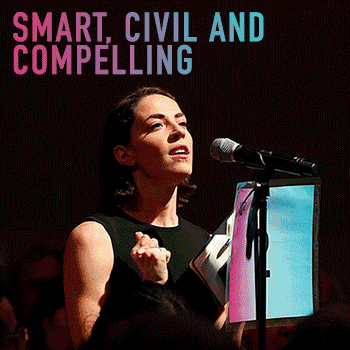
Are we prepared for climate change and the next migrant crisis?
Opinion + AnalysisClimate + EnvironmentPolitics + Human Rights
BY Kate Prendergast 7 MAY 2019
A powerful infographic published in 2014, predicted how many years it would take for a world city to drown.
It used data from NASA, Sea Level Explorer, and the Intergovernmental Panel on Climate Change. Venice will be the first to go under apparently, its canals rising to wetly throttle the city of love. Amsterdam is set to follow, Hamburg next.
Other tools play out the encroachment of rising tides on our coasts. This one developed by EarthTime shows Sydney airport as a large puddle if temperatures increase by four degrees. There’s also research suggesting our ancestors may one day look down to see fish nibbling on the Opera House sails.
Climate change refugees will become reality
Sea level rise is just one effect of anthropogenic climate change that would make a place uninhabitable or inhospitable to humankind. It’s also relatively slow. Populations in climate vulnerable hotspots face a slew of other shove factors, too.
Already, we are seeing a rising frequency of extreme weather events. Climate change was linked to increasingly destructive tropical cyclones in a report published in Nature last year, and Australia’s Climate Council attributed the same to earlier and more dangerous fire seasons. Rapidly changing ecosystems will impact water resources, crop productivity, and patterns of familiar and unfamiliar disease. Famine, drought, poverty and illness are the horsemen saddling up.
Some will die as a result of these events. Others, if they are able, will choose to stay. The far sighted and privileged may pre-empt them, relocating in advance of crisis or discomfort.
These migrants can be expected to move through the ‘correct’ channels, under the radar of nativist suspicion. (‘When is an immigrant not an immigrant?’ asks Afua Hirsch. ‘When they’re rich’.)
But many more will become displaced peoples, forcibly de-homed. Research estimates this number could be anywhere between 50 million and 1 billion in the 21st century. This will prompt new waves of interstate and international flows, and a resultant redistribution and intensification of pressures and tensions on the global map.
How will the world respond?
Where will they go? What is the ethical obligation of states to welcome and provide for them? With gross denialism characterising global policies towards climate change, and intensifying hostility locking down national borders, how prepared are we to contend with this challenge to come?
“You can’t wall them out,” Obama recently told the BBC. “Not for long.”
While interstate climate migration (which may already be occurring in Tasmania) will incur infrastructural and cultural problems, international migration is a whole and humongous other ethical conundrum. Not least because currently, climate change migrants have almost no legal protections.
Is a person who moves because of a sudden, town levelling cyclone more entitled to the status of climate migrant or refugee (and the protection it affords) than someone who migrates as a result of the slow onset attrition of their livelihood due to climate change?
Who makes the rules?
Does sudden, violent circumstance carry a greater ethical demand for hospitality than if, after many years of struggle, a Mexican farmer can no longer put food on the table because his land has turned to dust? Does the latter qualify as a climate or economic migrant, or both?
Somewhat ironically (and certainly depressingly), the movement of people to climate ‘havens’ will place stress on those environmental sanctuaries themselves, potentially leading to concentrated degradation, pollution and threat to non-human nature. (On the other hand, climate migration could allow for nature to reclaim the places these migrants have left.)
There is also the argument that, once migrants from developing countries have been integrated into a host country, their carbon footprint will increase to resemble that of their new fellow citizenry – resulting in larger CO2 emissions. From this perspective, put forward by Philip Cafaro and Winthrop Staples, it is in the interests of the planet for prosperous countries to limit their welcome.
Not that privileged populations need much convincing. Jealous fear of future scarcity, a globalisation inflamed resentment towards the Other, a sense that modernity has failed to deliver on its promise of wholesale bounty: all these are conspiring to create increasingly tribalised societies that enable the xenophobic agendas of their governments. A recent poll showed that 46 percent of Australians believe immigration should be reduced, a percentage consistent with attitudes worldwide.
A divided world
In the US, there’s Trump’s grand ‘us vs them’ symbol of a wall. As reported in the Times, German lawmakers are comparing refugees to wolves. In Italy, tilting towards populism and the right, a mayor was arrested after transforming his small town into a migrant sanctuary.
Closer to home, in a country where the 27 years without recession could be linked to immigration, there’s Scott Morrison’s newly proposed immigration cuts. There’s Senator Anning blaming the Christchurch massacre on Muslim immigration. There’s the bipartisan support for the prospects, wellbeing and mental health of asylum seekers to deteriorate to such an extent, the UN human rights council described it as ‘massive abuse’.
Yet the local effects of climate change don’t have a local origin. Causality extends beyond borders, piling miles high at the feet of industrialised countries. Nations like the US and Australia enjoy high standards of living largely because we have been pillaging and burning fossil fuels for more than a century. Yet those least culpable will bear the heaviest cost.
This, argues the author of a paper published in Ethics, Policy and Environment, warrants a different ethical framework than that which applies to other kinds of migration. He concludes that industrialised nations “have a moral responsibility … to compensate for harms that their actions have caused”.
This responsibility may include investing in less developed countries to mitigate climate change effects, writes the author. But it also morally obliges giving access, security and residence to those with nowhere else to go.
MOST POPULAR
ArticlePOLITICS + HUMAN RIGHTS
Do states have a right to pre-emptive self-defence?
EssayBUSINESS + LEADERSHIP
Understanding the nature of conflicts of interest
ArticleBeing Human
The problem with Australian identity
EssayBUSINESS + LEADERSHIP




